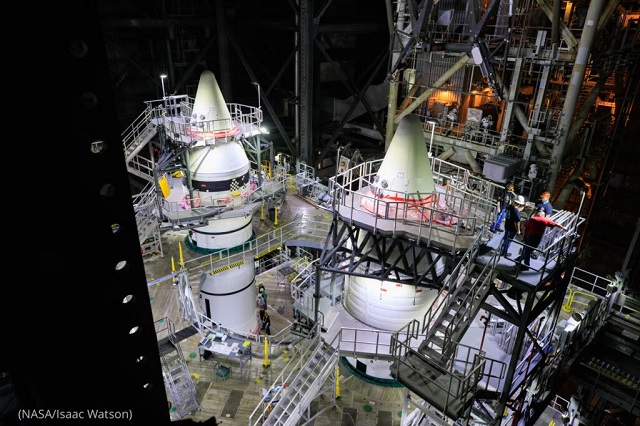President Biden is committed to NASA’s multilateral mission to return to the moon and send astronauts to Mars.
“Through the Artemis program, the United States is building the broadest and most diverse international human space exploration coalition in history,” Secretary of State Antony Blinken said in November 2022.
The Artemis program aims to land the first woman and next man on the moon by 2024, and is planning for a human mission to Mars.
The world honors space exploration on International Day of Human Space Flight, April 12, the anniversary of the first manned space flight by Yuri Gagarin of the Soviet Union in 1961. U.S. astronaut Neil Armstrong became the first person to walk on the moon on July 20, 1969. The State Department marks Space Diplomacy during a week in May.

The Space Launch System rocket boosters stand fully assembled at the NASA Kennedy Space Center in Florida. (NASA/Isaac Watson)
The Artemis moon landing will be the first time humans have reached the moon since NASA’s Apollo 17 mission in 1972. Artemis I launched in November 2022. Although Artemis I did not have a crew, it was the first in a series of missions that will enable future human exploration of the moon and Mars.
NASA announced a team of 18 astronauts for future Artemis missions. The team reflects the diversity and range of opportunity within the United States, with women and people of color making up half of the team.
The Artemis program is also bolstering international partnerships. The United States and seven other nations signed the Artemis Accords on October 13, 2020. The Artemis Accords are a series of guiding principles to ensure future space exploration is peaceful, sustainable and beneficial to all.
The Artemis Accords follow the principles of the Outer Space Treaty of 1967, which prevent nations from claiming sovereignty over outer space, and seek to facilitate exploration, science and commercial activities for all humanity to enjoy. More than 20 countries have already signed the agreement, which includes Australia, Canada, Italy, Japan, Luxembourg, Ukraine, the United Arab Emirates, the United Kingdom and the United States.
NASA officials say partnering on space exploration will foster more positive relationships on Earth.
Since taking office in 2021, Biden has hailed NASA missions, such as the February 18, 2021, landing of the Perseverance rover on Mars, as showing the value of international collaboration. The rover will search for signs of ancient life on Mars using technology from nations across Europe.
“It’s on a mission of exploration, with elements contributed by our European partners to seek evidence of the possibility of life beyond our planet and the mysteries of the universe,” Biden told the Munich Security Conference February 19, 2021. “That’s what we can do together.”
A version of this story was published on April 9, 2021.
The original article is here on ShareAmerica.







COMMENTS1
バイデン大統領は50,年゛理に月へ降りる宇宙飛行士
ぱ女性の宇宙飛行士と有色人種の宇宙飛行士と公言しています。有色人種の宇宙飛行士は黒人というのが一般的な見方ですが月周回ロケットの搭乗者は白人男性、黒人男性、白人女性
カナダ人男性の宇宙飛行士と発表されました。以上から月面着陸の宇宙飛行士に日本人が選ばれる可能性高いと考えますが
どうでしょうか。
LEAVE A COMMENT
TOP